Do you realize just how clever that sleek smartphone in your pocket is? The truth is that most of us are only scratching the surface of what these things will do, and it’s a lot more than just GPS, music, video, texting and games. As well as the huge collection of wireless radios inside every handset, there are a growing number of sensors, which offer anything from pressure sensing to motion and temperature. Each of these sensors can be used by apps, and once you take a long look at what’s available you will be amazed at what our tiny handheld computer phones can do.
GammaPix turns your phone into a radiation detector. A real one. It does this miraculous trick by using the camera as an ultra sensitive ionizing radiation detector, but you’ll need to do some careful calibration first, and there’s no way it’s as sensitive as a real Geiger counter. A reading of the environment takes around 5 minutes if there’s no danger, but shorter if the app detects excessive levels of radiation. There are enough warnings and caveats littered around to make sure you understand you use this at your own risk.
This clever Metal Detector app uses your phone’s magnetic sensor to detect whether there’s any metal in the vicinity. It obviously won’t work with any non-magnetic material, but in our tests it really did register metal, even relatively small pieces such as you’d find in a door chain, incredibly well. The meter would shoot up from a default ambient 49u to 200+u. We couldn’t get it to register with metal wires embedded in our walls, but that’s maybe because the magnetic disturbance is too small. Quite an amazing tool though, even so.
Light Meter provides a light intensity meter which measures lux. The app uses the integrated light sensor in your phone, and can measure from 0 to 1000 lux in 2 ranges. As with most of these sensor apps, accuracy depends on first calibrating the phone properly, and in this case you need a real light meter to do the job properly. We found that the results were a little variable, but with better calibration we suspect this could be cured.
Most of the modern smartphones now contain barometric sensors (to help with GPS) which is how this Altimeter works. If you’re in a situation where you need to know how high up you are, this is the app to use. It actually uses either the barometric or GPS sensor, so there’s dual fallback in case you need to land that plane in an emergency. We couldn’t find a handy mountain to test, but it definitely worked up two flights of stairs.
The Sound Meter app is less of a surprising app, since it uses your phone’s microphone to take its readings. The app features a beautifully sensitive display, complete with a rolling chart of sound differences as they occur. It’s a great way to test your environment to see if you’re being subjected to excess noise, but probably not something you want to use in a crowded bar or club. We particularly like the text chart which shows equivalent sound levels as examples, e.g. busy street, alarm clock.
So if you’re ever stuck in a plane with a broken cockpit there should be enough apps out there to get you home in one piece if you don’t panic. This Aircraft Horizon tool uses the phone’s accelerometer, gyro and magnetometer to deliver pitch and roll information for your horizon needs. It’s part of a full set of free aircraft gauges, which seem to work extremely well. The only caveat is you need to pay for the full version to get more than 2 mins use per session.
This Thermometer app uses the internal temperature sensor, GPS and an Internet based weather service to provide both inside and outside temperatures in C or F. The inside temperature is clearly an ambient one, so it can vary from reality depending on the temp of the phone’s internals. Nevertheless it seems fairly accurate, and it’s definitely one up on sticking a finger in the air.
The EMF Sensor app uses the magnetic field sensor of your handset to take readings of local EMF (electro-magnetic fields) in the environment. Our testing showed that it definitely works, and if you want to try it out hold the phone up to the side of your monitor or laptop screen, and you’ll see the needle rise as it detects the increased EMF. We also found a scary amount of leakage from our microwave oven front panel during its operation! Well OK, not leakage, just a heavy duty field, which is normal. But still….
Designed to provide a warning if an earthquake is imminent, we’re not sure whether this Earthquake Vibration Sensor will work very well unless left sitting permanently on a desk as a static alarm. We also suspect that you will need to live in a vulnerable area to get the most out of this app, which leaves out most of us living in quake free bliss. Nevertheless an interesting application.
Physical fitness freaks may need to check out this Push-Up Sensor Male app, if only to reassure themselves that they don’t really need it. The software uses the proximity sensor of your phone to detect whether you’re doing your push-ups properly or not. Whether this is valuable to you will depend largely on your self-confidence, age and amount of pizza consumed per calendar month. For the rest of us, we can just sit back and enjoy the view.
Continue Reading… 1 2 3 [View All]

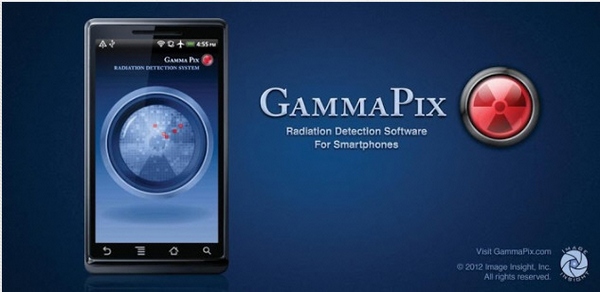

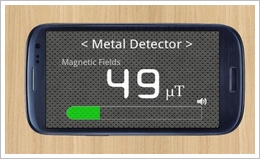
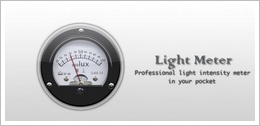

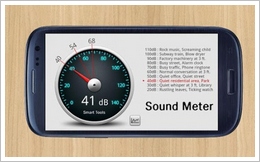




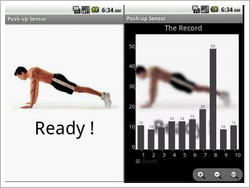



Hi Nigel, if you like you can add my light sensor app also in this article. It is being used by 300 active users rightnow. Here is the link: https://play.google.com/store/apps/details?id=com.app.lightsensor
Thanks